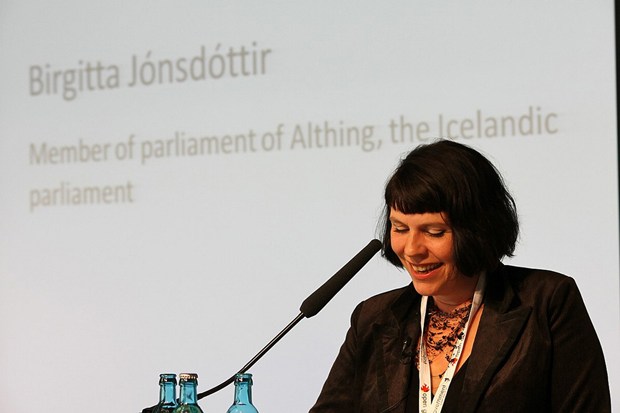 Iceland Pirate Party leader Birgitta Jónsdóttir, speaking at an event in 2011 while an MP for the Citizens' Movement partyG20NWD/Flickr/CC BY-SA 2.0
Iceland Pirate Party leader Birgitta Jónsdóttir, speaking at an event in 2011 while an MP for the Citizens' Movement partyG20NWD/Flickr/CC BY-SA 2.0
Iceland's latest national election has seen the Pirate Party
there narrowly manage to surpass the five percent vote share needed
to win seats in the country's parliament. Its three ministers are
the first politicians from any Pirate Party to win seats in a
national election.
The island's national parliament, the Althing, was first founded
in 930 and is generally considered to be the oldest representative
parliament in the world. Its 63 seats are divided up
proportionately among the parties running, with a five percent
threshold for receiving seats. The Pirate Party -- whose leader
Birgitta Jónsdóttir is best known internationally for her work with
Wikileaks and her support for its operations in the wake of criticisms by the
American government -- squeaked in at 5.1 percent.
That gives the Pirate Party three seats, making it the smallest
party in the Althing and one of two being represented for the first
time (the other being the liberal Bright Future party). Those three
members of parliament represent the first victory anywhere for a
Pirate Party at the level of a national election.
Across Europe, pirate parties are having mixed success. While
occasional local election successes have been welcome, there have
been repeated failures to win seats at the national level. The
German Pirate Party surprised many by failing to make the jump from state to national success last
year, and even the Swedish Pirate Party -- the first, and most
successful Pirate Party, with two MEPs in the European Parliament
-- failed to secure representation in Sweden's national
legislature.
The current plan for the pirate parties of Europe is to join together for a united push for the European Parliament in
the forthcoming elections of 2014, with candidates running in at
least 25 different countries.
The winners of the election were the
centre-right Progressive and Independence parties, both of
which are strongly Eurosceptic and benefitting from a left-wing
vote split among a host of new anti-establishment parties -- so
many that, according to the Independent, there is "genuine
confusion" as to how many there are (though in the end there were
15 competing in the election, up from seven in 2009). Only six won
more than five percent to gain seats.
The combined 51.1 percent of the vote, and 38 of 63 seats,
should give the two parties the basis of a governing coalition.